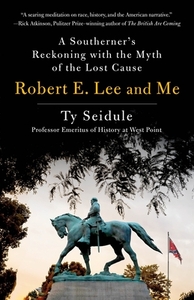Take a photo of a barcode or cover
242 reviews for:
Robert E. Lee and Me: A Southerner's Reckoning with the Myth of the Lost Cause
Ty Seidule
242 reviews for:
Robert E. Lee and Me: A Southerner's Reckoning with the Myth of the Lost Cause
Ty Seidule
Dr. Seidule creates a thorough analysis and debunking of Lost Cause myths. He also analyzes his hometown of Alexandria, VA (Lee’s hometown, too) and shows what a dreadful influence they had on his own upbringing. As much as I appreciated the analysis, it goes on long after the point is made. This would have made a better shorter piece like a brilliant lecture; however, the persistence of these myths is why his analysis was so complete.
informative
reflective
medium-paced
challenging
informative
inspiring
reflective
sad
medium-paced
“History is a set of lies agreed upon” -Napoleon Bonaparte
Without a doubt the most eye opening nonfiction book I’ve ever encountered. As an amateur American history buff my perspective on the confederacy and it’s legacy in the United States has been altered forever. I’m a white man who has lived his entire life in the north, I was aware of the inaccuracy of lost cause ideology and the reality that slavery was the cause of the Civil War, but I’m ashamed to say I still let the lost cause myth pervade my understanding of history. Growing up watching movies like Gettysburg, visiting the battlefield as a teen, and reading Civil War books as an adult, I would see the confederates as opponents but not necessarily enemies. Leaders like Lee I would accept as honorable opponents that were reluctant to fight the Union. Wrong in their beliefs certainly but equal in regard with men like Grant and Sherman. I’m here to tell you Ty Seidule set me straight. An author that’s not some political pundit or a newscaster with a 30 second opinion, but rather a man who has lived his life in the south, honorably served our nation’s armed forces for decades, and is a better expert on Civil War history than I could ever hope to be. Someone whose experiences, research, and conclusions I could easily respect. Someone who knows and deserves to be heard.
The lost cause myth is nothing more than a lie. Men like Robert E Lee were traitors that chose to disregard their oaths to the US military and fight to maintain the evils of slavery. It’s so strange how I’ve NEVER had these obvious facts spelled out in such a straightforward way before. I cannot recall a single documentary, history class, book, or film that portrays men like Lee, Pierre Beauregard, or George Pickett in such a complete light like this book did. Names of men historically honored and respected by many historians (and even the US military) that fought for slavery, committed treason and, in Pickett’s case, war crimes. I used to be conflicted on the issue of removing confederate statues and monuments on the country because I felt it was destroying history. It angered me to learn the truth of why most of the monuments were built: to perpetuate lies about why the civil war was fought and to resist desegregation efforts throughout the 20th century. With example after example the author highlights how the south won the narrative of the civil war and made so many people and organizations across the country, including myself, buy into the false history they sold the nation. Tear down all the confederate monuments. They only serve to hide the true history and the evils of slavery.
Language is so powerful, and I appreciated how Ty Seidule opts to use difference language to better illustrate the realities behind the civil war. Slave labor farm instead of the more idyllic “plantation.” His refusal to use the term “union army” when talking about the military history was inspired as well. Union and confederate gives the two sides a sense of equality when one side was actively against the United States Army and killed thousands of it’s soldiers. I’m going to follow his example in this regard when studying Civil War battles from now on.
Ultimately I’m thankful I happened to stumble upon an interview with the author recently on television, because it’s lead to a new understanding of my nation’s history and helped me overcome my own ignorance. It’s not easy to admit it was there to begin with, but accepting where you’ve been is the only way to be able to know where you’re going.
Without a doubt the most eye opening nonfiction book I’ve ever encountered. As an amateur American history buff my perspective on the confederacy and it’s legacy in the United States has been altered forever. I’m a white man who has lived his entire life in the north, I was aware of the inaccuracy of lost cause ideology and the reality that slavery was the cause of the Civil War, but I’m ashamed to say I still let the lost cause myth pervade my understanding of history. Growing up watching movies like Gettysburg, visiting the battlefield as a teen, and reading Civil War books as an adult, I would see the confederates as opponents but not necessarily enemies. Leaders like Lee I would accept as honorable opponents that were reluctant to fight the Union. Wrong in their beliefs certainly but equal in regard with men like Grant and Sherman. I’m here to tell you Ty Seidule set me straight. An author that’s not some political pundit or a newscaster with a 30 second opinion, but rather a man who has lived his life in the south, honorably served our nation’s armed forces for decades, and is a better expert on Civil War history than I could ever hope to be. Someone whose experiences, research, and conclusions I could easily respect. Someone who knows and deserves to be heard.
The lost cause myth is nothing more than a lie. Men like Robert E Lee were traitors that chose to disregard their oaths to the US military and fight to maintain the evils of slavery. It’s so strange how I’ve NEVER had these obvious facts spelled out in such a straightforward way before. I cannot recall a single documentary, history class, book, or film that portrays men like Lee, Pierre Beauregard, or George Pickett in such a complete light like this book did. Names of men historically honored and respected by many historians (and even the US military) that fought for slavery, committed treason and, in Pickett’s case, war crimes. I used to be conflicted on the issue of removing confederate statues and monuments on the country because I felt it was destroying history. It angered me to learn the truth of why most of the monuments were built: to perpetuate lies about why the civil war was fought and to resist desegregation efforts throughout the 20th century. With example after example the author highlights how the south won the narrative of the civil war and made so many people and organizations across the country, including myself, buy into the false history they sold the nation. Tear down all the confederate monuments. They only serve to hide the true history and the evils of slavery.
Language is so powerful, and I appreciated how Ty Seidule opts to use difference language to better illustrate the realities behind the civil war. Slave labor farm instead of the more idyllic “plantation.” His refusal to use the term “union army” when talking about the military history was inspired as well. Union and confederate gives the two sides a sense of equality when one side was actively against the United States Army and killed thousands of it’s soldiers. I’m going to follow his example in this regard when studying Civil War battles from now on.
Ultimately I’m thankful I happened to stumble upon an interview with the author recently on television, because it’s lead to a new understanding of my nation’s history and helped me overcome my own ignorance. It’s not easy to admit it was there to begin with, but accepting where you’ve been is the only way to be able to know where you’re going.
Another book many should read because the lost cause movement has poisoned so many people’s minds. Seeing a person, a southern just like myself grow up idolizing Lee but then over time learning about the truth and the absolute wrong doings by him and the confederacy is something more need to do. Understanding he committed treason and wanted to fight for slavery should be an automatic red flag in people’s minds but yet it flies right over. Many in my family fall for these lies spread since the end of the war but myself and a few others are constantly learning and finding more about the truth and how to fight the lost cause movement that is a cancer to society.
challenging
informative
reflective
slow-paced
Powerful. Seidule wrestles with the racism that influenced how he grew up and how he saw the world as he works to understand the role Robert E. Lee played in this country's past and how this country refuses to honestly confront that. As he writes towards the end of the book: "We do have a responsibility to acknowledge the past, to acknowledge the facts. The past does not have to control us, especially if we understand it." I learned a lot and and I thought a lot reading this.
Excellent read.
Identified with the author on several facets - Southerner coming of age in the 1980s and as a career Army officer; we even have a West Point link - he taught there, I am a graduate (though not there at the same time).
I never particularly wanted to be a Southern gentleman, however, my early life was steeped in many of the same ideas - only a few generations removed from the Civil War era.
Funny how moving away from home, traveling the world, and constantly reading opens one’s eyes and changes your thinking (when willing - know plenty who never will).
The challenge now is to continue overcoming that thinking - to recognize we are all human and race should not be what ever divides us.
Identified with the author on several facets - Southerner coming of age in the 1980s and as a career Army officer; we even have a West Point link - he taught there, I am a graduate (though not there at the same time).
I never particularly wanted to be a Southern gentleman, however, my early life was steeped in many of the same ideas - only a few generations removed from the Civil War era.
Funny how moving away from home, traveling the world, and constantly reading opens one’s eyes and changes your thinking (when willing - know plenty who never will).
The challenge now is to continue overcoming that thinking - to recognize we are all human and race should not be what ever divides us.
informative
reflective
The subtitle of this book is A Southerner’s Reckoning with the Myth of the Lost Cause. Ty Seidule is a retired Brigadier General in the US Army and Emeritus Professor of history at the US Military Academy at West Point who grew up revering General Robert E. Lee.
This book blends memoir/self-reflection with the historical record to demonstrate how the lost cause myth has persevered and why it needs to be addressed. As this book notes, “we find it hard to confront our past because it’s so ugly, but the alternative to ignoring our racist history is creating a racist future.”
A readable and fascinating history of racial politics in the US.
This book blends memoir/self-reflection with the historical record to demonstrate how the lost cause myth has persevered and why it needs to be addressed. As this book notes, “we find it hard to confront our past because it’s so ugly, but the alternative to ignoring our racist history is creating a racist future.”
A readable and fascinating history of racial politics in the US.
Dr. Seidule creates a thorough analysis and debunking of Lost Cause myths. He also analyzes his hometown of Alexandria, VA (Lee’s hometown, too) and shows what a dreadful influence they had on his own upbringing. As much as I appreciated the analysis, it goes on long after the point is made. This would have made a better shorter piece like a brilliant lecture; however, the persistence of these myths is why his analysis was so complete.






